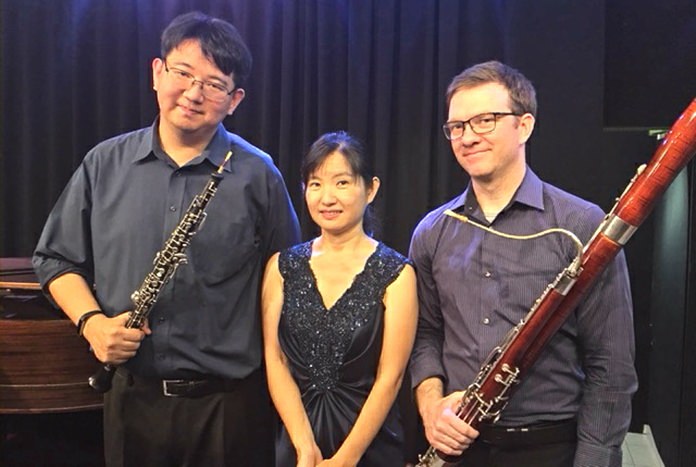
It’s not often that you hear the words “French chamber music” and “Jomtien” in the same sentence. But the two coincided recently when three musicians from Mahidol University’s College of Music gave a performance of (mostly) French chamber music at Ben’s Theater.
 Oboist Cooper Wright has recently returned from Indonesia where he performed as Principal Oboist with the Bandung Philharmonic and with the Amadeus Symphony Orchestra in Jakarta. He was previously the Principal Oboist in the Thailand Philharmonic Orchestra and was joined by bassoonist Dr. Christopher Schaub who is also on the staff of the College of Music and is Co-Principal Bassoon of the Thailand Philharmonic Orchestra. Pianist Yoshimi Sato has been on the piano faculty at the College and is a piano accompanist of the Kita-Kyushu City Kokura Junior Chorus in Japan.
Oboist Cooper Wright has recently returned from Indonesia where he performed as Principal Oboist with the Bandung Philharmonic and with the Amadeus Symphony Orchestra in Jakarta. He was previously the Principal Oboist in the Thailand Philharmonic Orchestra and was joined by bassoonist Dr. Christopher Schaub who is also on the staff of the College of Music and is Co-Principal Bassoon of the Thailand Philharmonic Orchestra. Pianist Yoshimi Sato has been on the piano faculty at the College and is a piano accompanist of the Kita-Kyushu City Kokura Junior Chorus in Japan.
Needless to say, these are fine musicians and the audience at Ben’s Theater was treated to a superb evening. The performers had thoughtfully included some lesser-known works and I was full of eager anticipation. Judging by the general frisson in the bar before the concert, so was everyone else.
Camille Saint-Saëns is perhaps best-known for The Carnival of the Animals, which he composed as a bit of fun. But he wrote more serious works too, including a dozen operas as well as symphonies, concertos and chamber music. The oboe sonata dates from 1921, the last year of his life. The first three notes of the sonata quote the Westminster Chimes sounded by London’s famous clock known erroneously as Big Ben. Cooper’s tone quality, phrasing and articulation were impressive. The tempo of each movement increases and the virtuosic last movement which Cooper played superbly is an enormous technical challenge.
The music of Gabriel Pierné isn’t played often these days, despite the fact that he wrote several operas, choral works and symphonic pieces. He was also a conductor and in 1910 famously conducted the world premiere of Igor Stravinsky’s ballet The Firebird. Pierné wrote his Solo de concert for bassoon and piano in 1898 and a dramatic piece it is too, with a heroic first movement and a wealth of lovely melodies. Chris Schaub produces a striking lyrical tone in the high register and a rich powerful sound in the bass notes. This work proved an excellent showcase for his performance skills and pianist Yoshimi Sato provided confident performances throughout. The sound of the eighty-year-old Steiff grand piano was perfect because it reflected the kind of tone quality with which these composers would have been familiar.
Before performing Poulenc’s remarkable Sonata for oboe, Cooper explained its historical significance. Dating from 1962, it was dedicated to the memory of Sergei Prokofiev who had died nine years earlier. Poulenc purposely made it a challenging work to play and it uses the extreme notes of the instrument in close proximity to each other requiring exceptional skill to perform them accurately. There are sudden changes of mood and sharp contrasts in the music. It’s a bit like leafing through a photograph album and seeing frozen and unconnected moments in someone’s life. Except that Poulenc’s music is anything but frozen – it’s at times playful, theatrical, mischievous, declamatory and often lyrical.
Poulenc had a great gift for melody and this shows itself in the tender and affectionate music in the middle of the second movement. It’s thought that the last movement, entitled Déploration is the last piece Poulenc wrote before he died. It has moments of anger and passion but it slowly fades away ending on a plaintive sustained E flat on the oboe with subdued low chords on the piano. It’s virtually an obituary to Prokofiev.
Ferdinand David’s Concertino for Bassoon is a light and airy work dating from 1840 and the dance-like second movement with its lilting melodies has a prominent piano part which Yoshimi Sato handled with confidence. Chris gave a splendidly assured performance which brought hoots of delight from the audience. Incidentally, Ferdinand David was born in the same house in Hamburg where Mendelssohn had been born the previous year.
Poulenc’s thoroughly charming Trio for oboe, bassoon and piano was composed in Cannes in 1926 and showed the musicians at their best, with a superb sense of ensemble and fine dynamic control. The pastoral second movement exudes Gallic charm and always reminds me of a riverbank scene from the book Wind in the Willows. It was given a delightful performance with lovely woodwind tone and expressive piano playing. The brilliant spiky finale was superbly played much to the delight of the audience.
As an encore, the trio performed the last movement of a work by the French oboist and composer Theodore Lalliet. It turned out to be a spirited if slightly eccentric musical romp, but it brought a superb concert to a joyful and ebullient close.





